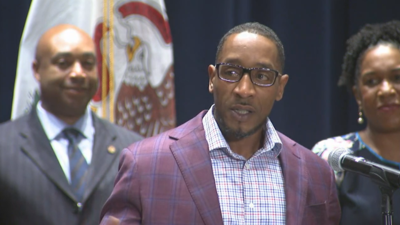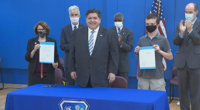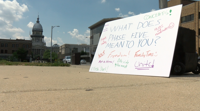SPRINGFIELD, Ill. �� Illinois will ban police from lying to children and teens during interrogations starting January 1. Gov. JB Pritzker signed a into law Thursday making Illinois the first state in the country to ban the deceptive tactic.
Most law enforcement groups and courts across the country argue these techniques increase the likelihood of minors making false confessions.
This may seem like commonsense legislation, but there are still many teens who suffer behind bars due to the police tactic. Pritzker hopes this law can be an example for the entire country.
“This is a moment where we get to mark truly one of the most joyous and important accomplishments for a fair and safe criminal justice system,�� Pritzker said.
Terrill Swift was one of four Black teens framed for murder and rape by Chicago police in 1995. Police brought the then 17-year-old in for questioning, even though he knew nothing about the crime. Swift spent over 15 years in prison before his release for the wrongful conviction. He feels this law could have saved his life.
RELATED:
“When it was first brought to me, it touched me in the sense that it could’ve saved my life. But the reality is I can’t get what I got back,�� Swift said. “So, moving forward, I want to try and help and make sure that this doesn’t happen again.��
Swift acknowledged several exonerees with him at the bill signing ceremony Thursday. He also noted what this means to the memory of Michael Saunders, another of the “Englewood Four�� who spent years in prison. Saunders was shot and killed last month. He said deceptive interrogations happen too often and something needed to change.
“This bill passing is a great step,�� Swift said. “But, we still have so much work to do. We still have so much work to do because there are so many brothers and sisters still there now wrongfully. And we can all agree that one day in prison wrongfully is too long.��
“A new era in public safety��
Another new encourages the move away from mass incarceration to instead repair harm and address trauma. Sponsors explained this law creates safer spaces for crime survivors and allows people to speak freely without worry that their words can be used against them.
“Chicago sports teams have better draft records than tough-on-crime policies have providing us safety,�� said Sen. Robert Peters (D-Chicago). “It is time that we move towards a new era in public safety �� public safety for all, public safety by the people, public safety that belongs to us.��
A separate signed Thursday allows prosecutors to motion for resentencing for clients who may deserve a reduced sentence. The law gives courts the ability to consider disciplinary records, evidence of rehabilitation, and reduction of risk to society.
“We must end mass incarceration and continue to reduce our state’s prison population,�� said Lt. Governor Juliana Stratton. “We must invest in communities and better support those who have been harmed �� whether by individuals or by systems. And through it all, we must honor one another’s humanity and have a bolder vision about what’s possible and what true community safety means.��
The signed into law creates a resentencing task force to examine ways to reduce the Illinois prison population. That group will provide recommendations to lawmakers and the governor by July 1, 2022.
“Our mass incarceration crisis has had such a negative profound impact on our country,�� said Rep. Justin Slaughter (D-Chicago). “It was important for Illinois, important for our state, to take the next step of looking at resentencing policies.��














